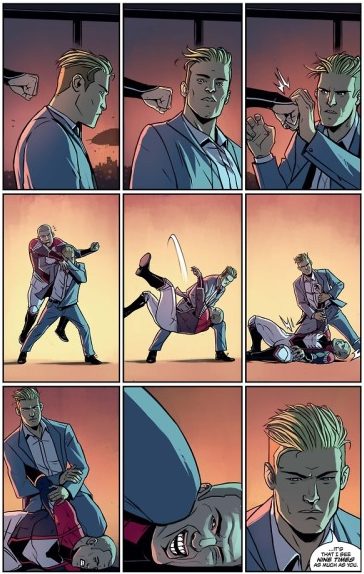Pratchett's companion, nine panels and the Brexit hellscape.
Updates
That I finally got off my ass and joined the union in my day job will tell you all you need to know about the kind of week it’s been. Needless to say this week’s edition is a tad shorter than normal, for which I apologize.
This week I’ve also mostly been thinking about this Twitter thread:
The best career advice I ever received–not writing advice, of which I have received roughly a metric shitton, but “how to survive as a working writer” advice–came from Todd McCaffrey the first time we met at a con.

Curriculum Issue #5 is just approaching its halfway point this week. This is the first issue of the series that I wrote the script for with art and letters by Bryan Coyle and colours by Mitchell Doig. Bear, being presented as probably the most unlikable character on board the ship so far, was a hell of a lot of fun to write.
Links
First up an excellent and heart warming story from EuroGamer about the late Terry Pratchett’s work on, of all things, a mod for Oblivion.
“Vilja went from a normal companion to someone who would notice when you hadn’t played in a few days - thanks to another mod - and someone who could take control of tricky situations and escort you to safety when times got tough. From conducting alchemy tests in the house Emma built for them in Aleswell to chasing Chico the donkey halfway across Cyrodiil, Pratchett and Vilja shared many adventures that influenced his life, both creatively and at home.”
The article also goes into how the mod helped Pratchett explore some of the dungeons in the game despite a failing memory, which in turn steered the direction the development of the mod would go.
Staying on video games, Tyler Opal Wallowa, has written an engaging piece about level/architecture design in the seminal first person shooter, Half Life, and how that level design directs and ‘others’ the player character.
“Half-Life differs from other 90’s shooters because it’s persistently dangerous atmosphere comes from the pace of exploration and combat. Unlike in its contemporaries, players are encouraged through a combination of level design, hit-scan weapons, and character fragility to approach combat situations delicately. Among the most critical changes is how circle strafing isn’t viable in the game’s cramped, dangerous corridors. Many levels just aren’t suited for combat, due to Black Mesa’s crumbly infrastructure and various pitfalls. Players are more likely to plummet to their deaths than avoid bullets.”
The piece makes the best case yet for the almost universally abhorred end game level design.
Switching to comics, I always enjoy reading Claire Napier’s work over at WWAC and her latest piece, on recent uses of the nine panel grid, is essential reading.

It made me appreciate just how brash and cheeky that Peter Cannon page above is too. Bravo!
Turning to the hell hole that is modern British politics, Laurie Penny at the Pacific Standard weighs in on how austerity influenced Brexit.
“Brexit was all about leaving the Idea of Europe, which nobody cared about before the Brexiteers began casting Europe as the root of all of our gnarliest cultural complexes—including Britain’s complex about its new and diminished place in a changing world that it no longer owns most of.”
I feel like Penny nails it with that last part. It’s become increasingly obvious that most of this mess is down to this mass hallucination amongst certain sections of the populace that we’re still a major figure on the world stage, the sad reality being that we haven’t been for nigh on half a century.
Weird internet practice of the week? New Statesman on the act of having an alt account on social media.
Finally, Slate covers the sub-genres (?) of cyber-punk, stating authors should perhaps think of dropping the punk suffix altogether.
“Yet I have come to suspect these punk derivatives signal something more than the usual merry-go-round of pop culture. These punks indicate that something is broken in our science fiction. Indeed, even when they reject it, these new subgenres often repeat the same gestures as cyberpunk, discover the same facts about the world, and tell the same story. Our hacker hero (or his magic-wielding counterpart) faces a huge system of power, overcomes long odds, and finally makes the world marginally better—but not so much better that the author can’t write a sequel. The 1980s have, in a sense, never ended; they seem as if they might never end.”
Right, I’m off to stare slack jawed in disbelief at endless Pro-Brexit memes that elderly relatives keep endlessly posting on Facebook.
See you in two!